Jan. 6 to Jan. 11
Protesters from the Presbyterian Church in Taiwan surrounded a police car in the afternoon of Jan. 8, 1988, after discovering a cache of wooden clubs, spears and swords inside. They demanded to know if the weapons were to be used against them, and the situation escalated as the two sides clashed.
The churchgoers had gathered in support of Tsai Yu-chuan (蔡有全) and Hsu Tsao-te (許曹德), who were being tried for advocating Taiwanese independence at an event to celebrate the establishment of the Taiwan Political Victims Association (台灣政治受難者聯誼總會).
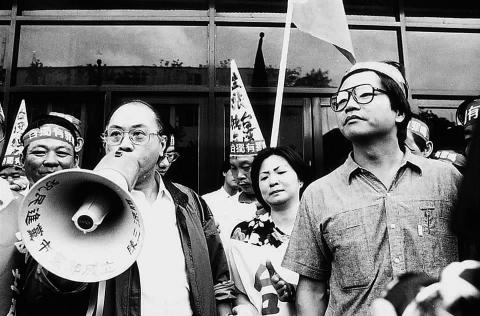
Photo courtesy of Tsai Yu-chuan
Tsai was a graduate of the church’s Tainan Theological College and Seminary. But the church’s involvement with Taiwanese independence dated back to August 1977, when it publicly declared that “Taiwan’s future should be decided by the 17 million residents of Taiwan.”
“To realize the wishes of Taiwanese to be independent and free, we urge the government to face the reality in this precarious international situation and take effective measures to make Taiwan a new and independent country,” the church said.
The church retains its stance to this day, continuing to urge the government through public statements.
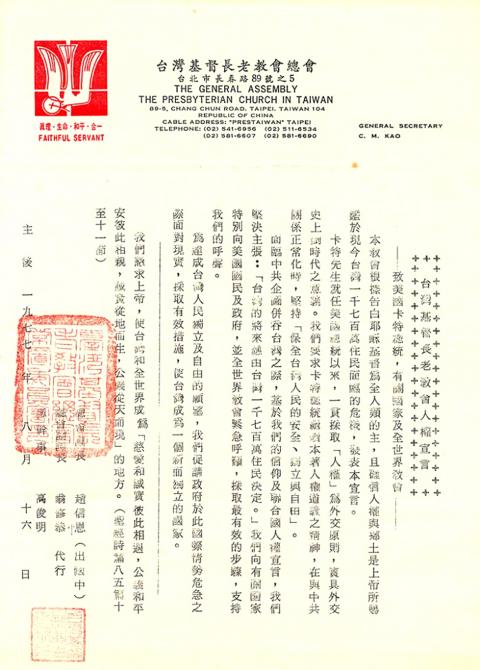
Photo courtesy of Presbyterian Church of Taiwan
THE PIOUS GET POLITICAL
In his memoirs, the late Reverend Kao Chun-ming (高俊明) writes that bad blood between the Chinese Nationalist Party (KMT) and the Presbyterian Church in Taiwan began in the late 1960s, when the World Council of Churches (WCC) started supporting China’s entry to the UN and allowed several Chinese churches to join their organization.
The KMT was not happy, and essentially forced the Presbyterian Church in Taiwan to leave the WCC in 1970, presaging how Taiwan walked out of the UN when China was admitted a year later.
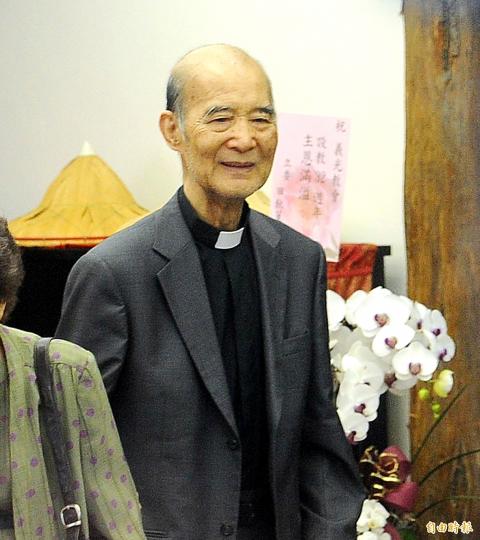
Photo: Fang Pin-chao, Taipei Times
Kao, who took leadership of the church in July 1970, released the first of three public declarations in December 1971.
He criticized the US for “selling out Taiwan” to repressive communist powers and urged the KMT to embrace democracy, so that Taiwan could still be respected by the world despite no longer being a UN member. Taiwanese independence was not yet mentioned; the church merely did not want Taiwan to be swallowed by China after losing its international clout.
“Nobody had spoken out despite our precarious situation, so the church decided that we needed to risk our lives and risk being shut down by the government to express the desires of most Taiwanese,” Kao recalls in his memoirs.
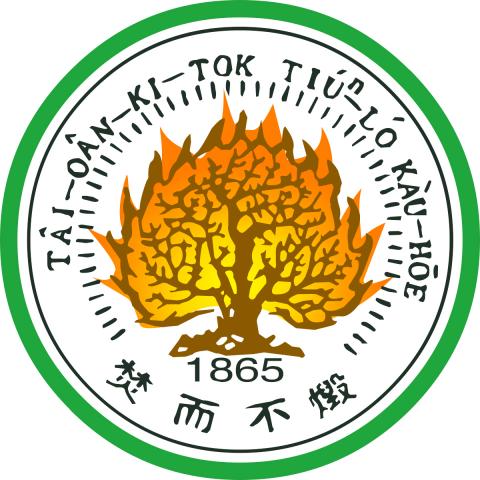
Photo courtesy of Wikimedia Commons
Despite government interference, the church managed to get the message out.
Afterward, Reverend Daniel Beeby of the Tainan Theological College and Seminary was expelled from Taiwan in 1972 for urging his students to embrace independence or risk being conquered by China. To him, the KMT’s insistence on the “one China” policy would only further marginalize Taiwan and lead to its eventual demise. Tsai, a fellow graduate of the seminary, would echo these sentiments in his struggles later on.
In 1975, the KMT confiscated the church’s Hoklo (also known as Taiwanese) Bibles and banned worshipers from singing Hoklo hymns. Coupled with then US President Gerald Ford’s upcoming visit to China, the church decided it was time for a second statement despite grave warnings from the KMT.
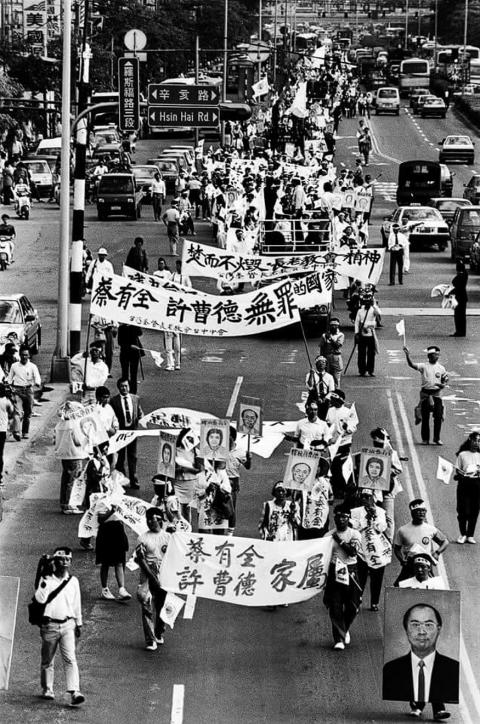
Photo courtesy of Tsai Yu-chuan
This statement was mostly focused on religious freedom, and advised the government to stop banning civic groups from joining international organizations just because they also allowed Chinese membership.
SENT TO JAIL
But Taiwan’s international situation only continued to worsen. By 1977, rumors were swirling that the US was about to break ties with Taiwan for China. Church leaders knew that they would get in trouble for their third statement openly advocating Taiwanese independence, and Kao writes that he and many pastors prepared their wills.
Kao narrowly avoided arrest, despite attempts by the government, probably due to the international clout of the church. But he became a marked man.
During this time, Tsai and other Tainan Theological College and Seminary students grew closer to dangwai (黨外) opposition politicians, with several joining the staff of the anti-KMT Formosa magazine (美麗島).
Tsai was one of several people with ties to the church who were arrested in the aftermath of the Kaohsiung Incident, in which protestors clashed with police at a pro-democracy rally organized by Formosa magazine. He was sentenced to five years in jail.
While Kao was not directly involved, he and several others were arrested a few months later for helping opposition politician Shih Ming-te (施明德) hide from the authorities. Kao served four years in prison.
After martial law was lifted in 1987, Tsai and Hsu immediately helped form the Taiwan Political Victims Association.
Hsu, who was also jailed for several years due to his activism, included the clause “Taiwan should be independent” in the association’s by-laws. And in a speech that same night, Tsai called for Taiwanese independence.
Both were arrested shortly after and sentenced to 10 and 11 years in prison respectively. The church strongly protested, calling for freedom of speech and taking to the streets several times during their trial.
Cheng Mu-chun (鄭睦群) writes in Taiwan Nation: The Presbyterian Church’s National Identity (從大中華到台灣國: 台灣基督教長老會的國家認同及其論述轉換) that despite its 1977 statement, the church tried to distance itself from the independence movement, declaring several times that their words were misinterpreted.
But after Tsai’s arrest and the April 1989 self-immolation of democracy activist Deng Nan-jung (鄭南榕), the church’s official Taiwan Church News (台灣教會公報) newsletter started openly publishing articles supporting independence, confirming the stance that it maintains to this day, Cheng writes.
Taiwan in Time, a column about Taiwan’s history that is published every Sunday, spotlights important or interesting events around the nation that have anniversaries this week.

Taiwan has next to no political engagement in Myanmar, either with the ruling military junta nor the dozens of armed groups who’ve in the last five years taken over around two-thirds of the nation’s territory in a sprawling, patchwork civil war. But early last month, the leader of one relatively minor Burmese revolutionary faction, General Nerdah Bomya, who is also an alleged war criminal, made a low key visit to Taipei, where he met with a member of President William Lai’s (賴清德) staff, a retired Taiwanese military official and several academics. “I feel like Taiwan is a good example of

March 2 to March 8 Gunfire rang out along the shore of the frontline island of Lieyu (烈嶼) on a foggy afternoon on March 7, 1987. By the time it was over, about 20 unarmed Vietnamese refugees — men, women, elderly and children — were dead. They were hastily buried, followed by decades of silence. Months later, opposition politicians and journalists tried to uncover what had happened, but conflicting accounts only deepened the confusion. One version suggested that government troops had mistakenly killed their own operatives attempting to return home from Vietnam. The military maintained that the

Before the last section of the round-the-island railway was electrified, one old blue train still chugged back and forth between Pingtung County’s Fangliao (枋寮) and Taitung (台東) stations once a day. It was so slow, was so hot (it had no air conditioning) and covered such a short distance, that the low fare still failed to attract many riders. This relic of the past was finally retired when the South Link Line was fully electrified on Dec. 23, 2020. A wave of nostalgia surrounded the termination of the Ordinary Train service, as these train carriages had been in use for decades

Lori Sepich smoked for years and sometimes skipped taking her blood pressure medicine. But she never thought she’d have a heart attack. The possibility “just wasn’t registering with me,” said the 64-year-old from Memphis, Tennessee, who suffered two of them 13 years apart. She’s far from alone. More than 60 million women in the US live with cardiovascular disease, which includes heart disease as well as stroke, heart failure and atrial fibrillation. And despite the myth that heart attacks mostly strike men, women are vulnerable too. Overall in the US, 1 in 5 women dies of cardiovascular disease each year, 37,000 of them